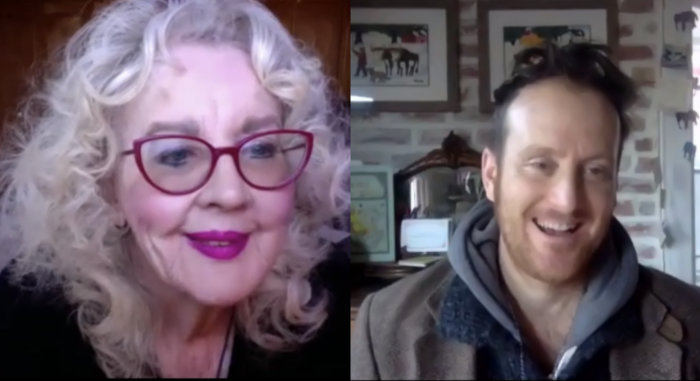Yesterday, I got to talk (and listen) with one of the world’s greatest writing teachers.
Writing, at its heart, is not about writing—but about listening, about finding our voice, about being of benefit—a spiritual path of catharsis, of turning confusion to wisdom. I fell in love.
She listed three key simple, repetitive practices to this path of listening:
“I found that when I wrote from a spirit of service, I was a better writer.” ~ Julia Cameron
View this post on Instagram
The following is excerpted from Julia Cameron’s latest book, The Listening Path, copyright © 2021, with permission from St. Martin’s Essentials. Get the book here.
~
It is almost seven P.M. on a July evening in Santa Fe, and the sky is still a bright, azure blue.
I sit on a bench amid trees and flowers. Birds chirp in the tree nearby. I can’t see them, hidden in the tapestry of leaves, but I hear them as clearly as if they are next to me on the bench. Farther in the distance, a raven caws. Is it communicating with my nearby songbirds, or is its conversation unrelated? Farther off, a dog barks. A light breeze shifts the tall purple flowers by my bench and they rustle against one another as they sway back and forth. A car passes by, its engine quieter than its heavy wheels crunching through the gravel below. Far in the distance, a horn honks on the main throughway. Wings flutter as a bird lights to the sky, gliding away and out of sight. Nearby, the songbirds’ chatter has slowed, but they still sing, a tuneful discussion in the greenery above. Earlier, it sounded as if they were all speaking at once. Now they seem to be taking turns. Are they listening to each other?
And what does it mean, to listen? What does it mean for us in our everyday lives? We listen to our environment, whether it is the chirping of birds or the commotion of the city streets—or perhaps we don’t listen, tuning it out instead. We listen to others—or perhaps we wish we listened better. Others listen to us—or we wish they did. We listen for our instincts, our hunches, our guidance—and perhaps we wish we could hear them more clearly and more often. The listening path asks us to tune into the many cues and clues that surround us every day. It asks us to take a moment to stop and listen—and argues that the moment spent tuning in, especially when we think we “don’t have time,” doesn’t take time, but gives us time … and gives us clarity, connection, and direction as well. Listening is something we all do—and something we can all do more of. Every life can be improved by improving our listening. The listening path is a gentle path, with tools along the way to become better listeners—to our environment, our fellows, and ourselves.
This book will serve as a guide, urging the reader to listen more carefully and to listen in deeper and deeper ways. When we listen, we pay attention. And the reward for attention is always healing. The listening path brings us healing, insight, and clarity. It brings us joy and perspective. Above all, it bring us connection.
THE PATH TO DEEPER LISTENING
Over the next six weeks, you will be guided to expand your own listening, one level at a time. Each form of listening builds upon the next. I have learned that if we consciously work to listen, our listening deepens quickly. Deepening our listening is not time consuming so much as it is a matter of paying attention. This book will guide you to deeper and deeper listening within the life you’ve got, whether your schedule is busy or open, whether you live in the country or in the city.
We all listen, and we all listen in a myriad of ways.
We listen to our environment, where tuning in to the sounds we might habitually tune out brings us surprising delight: the birds in the tree above enchant us; the tick-tick-tick of the kitchen clock brings us steadiness and comfort; the jangle of the dog’s tags on the water bowl reminds us of the determination of life.
We listen to other people, and we learn that we can listen more closely. When we listen—really listen—to what others have to say, their insight often surprises us. When we don’t interrupt, but wait, allowing our companions to extend a thought instead of rush to complete it, we learn that we can’t in fact anticipate what they will share. Instead, we are reminded that we each have so much to offer, and that, given the chance, our companions will offer something more than, and different from what we might expect. We just have to listen.
We listen to our higher self, and in doing this, we are led both to guidance and to clarity. We do not struggle to think something up; rather we listen and take something down. Very little effort is required; what we are after is accuracy of listening. The voice of our higher self is calm, clear, and plainspoken. We accept each insight as it comes to us, trusting the often-simple thoughts that appear as ideas, hunches, or intuition.
Practiced in listening to our higher selves, we are ready to listen yet more deeply, reaching beyond the veil to listen to those close to us who have passed on. We find the unique and individual ways that our connection remains intact, and the ability to explore and expand that connection with ease. Reaching further still, we learn to listen to our heroes, those who we have not met but wish we had. And finally, we learn to listen to silence, where we may find we discover the very highest form of guidance. One step at a time, the listening path is a gracious experience of becoming more in touch with our world, ourselves, our beloveds, and beyond.
Let us listen.
~
Excerpted from The Listening Path, copyright © 2021, with permission from St. Martin’s Essentials. Get the book here.







Read 9 comments and reply